| |
Observing
tips: Look
west 30 to 60 minutes after sunset when
the Sun has dipped 6o to 16o below the horizon.
If you see luminous blue-white tendrils spreading across the sky,
you've probably spotted a noctilucent
cloud. Although
noctilucent clouds appear most often at high latitudes such as Scandinavia
and Canada, they have been sighted
in recent years as far south as Colorado, Utah and Virginia. NLCs
are seasonal, appearing most often in late spring and summer. In
the northern hemisphere, the best time to look would be between
mid-May and the end of August. See also 2003,
2004, 2005
and 2006. |
 |
| |
| |
Photographer,
Location |
Images |
Comments |
|
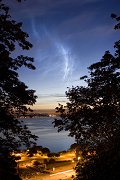
|
Jonathan Berry,
looking west over the southern point of Lake Washington (from
Renton, WA)
Jun. 19, 2007 |
#1,
more |
Photo details:
Canon
20D, 8 sec @ f/2.8, ISO 100, 24mm focal length
|
|
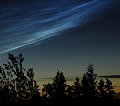
|
Kellen Harrel,
Portland, Oregon from balcony of house.
Jun. 19, 2007 |
#1 |
Photo taken
at 10:30 PM, the sky almost completely dark, and clouds
were glowing very brightly. This is the first time we have
seen these clouds in this area in 25 years.
Photo
details: Nikon
D200 on tripod, 12 second exposure. |
|
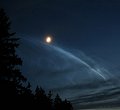
|
Wade B Clark Jr,
Lyman, Washington, USA
Jun. 19, 2007 |
#1 |
Photo
details: Canon
30D, 18-55mm lens,ISO setting 400, and autoexposure
mode. |
|
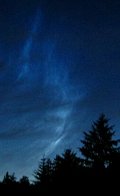
|
Bud Haake,
Tacoma, Washington
Jun. 19, 2007 |
#1 |
Hand-held digital camera, 2 second time exposure
|
|
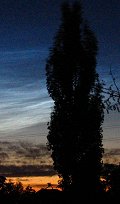
|
Steven J. Denfeld,
Bend, Oregon, USA
Jun. 19, 2007 |
#1,
#2, #3 |
Came out of
Barnes & Noble to see this brilliant display on the horizon.
This is the first noctilucent display I've seen this year.
It's also, by far, the brightest. By 10:30 local time, nearby
Venus was still being outdone. |
|
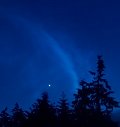
|
Liem Bahneman,
Bothell, Washington, USA
Jun. 19, 2007 |
#1,
#2, #3,
more |
First time I've ever seen noctilucent clouds from Seattle, and that's not from a lack of trying. The Moon, Saturn, Venus and Mercury make for a wonderful backdrop. Had they lasted another 15 minutes, the ISS and shuttle would have made their tandem passes.
|
|
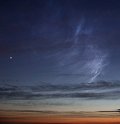
|
Lonnie Jackson,
Enumclaw, Washington, USA
Jun. 19, 2007 |
#1 |
Taken with Nikon
Coolpix 995 digital camera. The bright spot to the left
is Venus. |
|
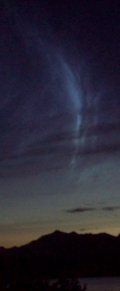
|
Robin and Kurt Schnuit,
Seabeck, Washington
Jun. 19, 2007 |
#1 |
Quite a view.
The Moon, the planets, and this bright, spectral cloud that
materialized over Mt. Jupiter, to the West. Breathtaking!
|
|

|
Linda Neilsen,
Looking west toward Olympic Mountains from Des Moines, WA
area.
Jun. 19, 2007 |
#1 |
Photo taken at 10:18 pm
PDT, June 19, 2007.I call the photos I have of this 'Night
Lights' with moon and Venus in it. Missed seeing the ISS
go overhead but this may have been my first time to see
such a noctilucent cloud.Wonderful.
Photo
details: Fuji
FinePix F470 |
|

|
Bridget E. Smith,
Portland, Oregon.
Jun. 19, 2007 |
#1 |
We were outside waiting
for STS 117 and the ISS to fly over Portland, Oregon. We
noticed these beautiful Noctilucent Clouds.
Photo
details: Handheld Olympus D-435, 5.1 megapixels
|
|
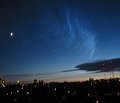
|
Steve R.,
Seattle, Washington, USA
Jun. 19, 2007 |
#1 |
Photo taken at 2213 hrs, view west towards downtown Seattle.
|
|
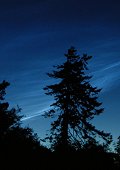
|
Brad Hill,
Warrenton, Oregon, USA
Jun. 19, 2007 |
#1,
#2, more |
I was so amazed to see my first Noctilucent Clouds, just as they were starting to 'turn on', that it took me over 20 minutes to think to go and get my camera. Stunning!
|
|
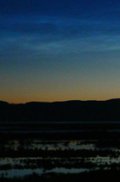
|
Jenaya Swenson,
Svensen, Oregon, USA
Jun. 20, 2007 |
#1,
#2 |
Though faint,
these clouds stood out against the predawn sky, and my camera
captured what my eyes couldn't see.
Photo
details: Panasonic Lumix DMC-FZ4, 8s exposure.
|
more
images (June 19): from
Miroslaw Fröhlich of Turek, Poland; |
|
|